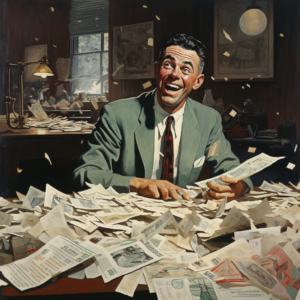Idle cash for a short period of time in a business tends to add up to substantial cost over the life of the business. Consider that the average savings account in the United States of say $20,000 in reserve can produce interest earnings of over $50,000 during the lifetime of the holding of that account.
This problem is magnified for businesses that are frequently holding onto conservative amounts cash or any cash beyond near term needs. Maintaining a healthy cash position is not without costs. As illustrated, cash maintained for working capital purposes can also be an uncounted liability over extended periods of time. Small businesses and Midsized businesses in particular tend to store cash inefficiently. The result is invisible losses to inflation or lost real income. Many larger firms equally use their cash inefficiently and much bear hidden risk despite supposed treasury management.
Cash and cash equivalents by implied yield:
- Money Market Funds
- Checking accounts
- Money Market Funds
- Savings accounts
- Treasury Bills
- Certificates of deposit (CD)
- Short term Bonds
- Corporate Bonds
- Municipal Bonds
- Equities
In contrast to reaching for yield, the objectives of a business should be a going concern. The safety of the institution holding the cash is generally overlooked. Banks and savings and loans can and do fail, however infrequently. Smaller banking and savings and loan institutions have been in the decline since the commoditization of the banking industry in the 80s.
The phrase, risk-free rate, stems from the fact that Treasuries are backed with the full faith and credit of the United States Government. Treasuries purchased through a bank are typically not held by that bank.
The FDIC Website states:
Customers who purchase T-bills at banks that later fail become concerned because they think their actual Treasury securities were kept at the failed bank. In fact, in most cases banks purchase T-bills via book entry, meaning that there is an accounting entry maintained electronically on the records of the Treasury Department; no engraved certificates are issued. Treasury securities belong to the customer; the bank is merely acting as custodian.
https://www.fdic.gov/consumers/consumer/information/fdiciorn.html
Customers who hold Treasury securities purchased through a bank that later fails can request a document from the acquiring bank (or from the FDIC if there is no acquirer) showing proof of ownership and redeem the security at the nearest Federal Reserve Bank. Or, customers can wait for the security to reach its maturity date and receive a check from the acquiring institution, which may automatically become the new custodian of the failed bank’s T-bill customer list (or from the FDIC acting as receiver for the failed bank when there is no acquirer).
Even though Treasury securities are not covered by federal deposit insurance, payments of interest and principal (including redemption proceeds) on those securities that are deposited to an investor’s deposit account at an insured depository institution ARE covered by FDIC insurance up to the $250,000 limit. And even though there is no federal insurance on Treasury securities, they are backed by the full faith and credit of the United States Government – the strongest guarantee you can get.
The conclusion you should draw is simple. Unless risk-free treasuries are held in lieu of cash your cash is at risk. Otherwise, the stretch for cash yield adds a layer of risk to the liquidity on the balance sheet.
Appendix Item: How Berkshire Manages Short-term cash
BECKY QUICK: This question comes from Ed Schmidt (PH) in Alaska. He’s asking about Berkshire’s cash.
He writes, “Where is that money held? All in Treasury bills or notes? If so, what will happen in June when the biggest buyer, the Fed, quits buying? Where is all that money on the sidelines? Is it under the mattress we saw two years ago?
“I don’t see how any significant amount of money can be in banks that aren’t paying interest, corporate bonds that are risky and not paying much interest, or government bonds that seem less and less sound as each day passes.”
WARREN BUFFETT: Well, he’s certainly right that all of the choices are lousy for short-term money now, but we don’t play around with short-term money. So we did not own commercial paper in 2008 before problems occurred. We did not own money market funds.
When I say we didn’t own them, maybe small amounts at various subsidiaries, but in terms of the big money, which we run out of Berkshire, we basically keep it in Treasurys.
And we get paid virtually nothing now for it, and that’s irritating, but the last thing in the world we would do at Berkshire is to try and get 5 or 10 or 20 or 30 basis points more by going into some other things with our short-term money.
It is a parking place. It’s an unattractive parking place, but it’s a parking place where we know we’ll get our car back when we want it.
You know, when we need — certainly the case — in September of 2008, we had committed for some time to put $6.5 billion in Wrigley when the Mars/Wrigley deal occurred, and we certainly didn’t contemplate at the time we made that commitment, which was probably in the summer, that the events would take place like they did in September and — but we had the money.
I knew I had to show up with 6 1/2 billion dollars — I think it was on October 6 — and, you know, I had to show up. (Laughs)
I couldn’t show up with a money market fund or some commercial paper or anything of the sort. I had to show up with cash.
And the only thing I feel — virtually the only thing I feel good about, in terms of having large amounts of ready cash is Treasury bills, and that’s where we’ve got — if you look at our March 31st statement, I think you’ll see 38 billion, and overwhelmingly that will be in Treasurys.
Charlie?
CHARLIE MUNGER: Well, of course, I’ve watched a lot of people struggle who thought it was their duty in life to get an extra 10 basis points on the short-term money.
I think it’s really stupid to try and maximize returns on short-term money if you’re in an opportunist game the way we are, where we want to suddenly deploy money.
Some of those pipelines we bought, they came for sale on Saturday, and we had to close on Monday or something?
WARREN BUFFETT: Yeah.
CHARLIE MUNGER: Why fool around with some dubious instrument when we had sudden needs for money like that?
WARREN BUFFETT: We bought one pipeline where the seller was worried about going bankrupt the following week. And there’s a Hart-Scott-Rodino clearance required through the FTC, and they needed the money right away, and we — I wrote a letter, as I remember, to the FTC, and I said that we will do whatever you tell us to do later on.
You can look at this all you want. We’ll give you all the data you want. And if you tell us, you know, to unwind the deal, whatever you tell us, we will do.
But these guys need the money, and so we closed it earlier. And our ability to come up with cash when people need it and when the rest of the world is petrified for some reason, has enabled several deals to get done.
We don’t know whether — that could happen tomorrow. I mean, if — you know, Ben Bernanke runs off to South America with Paris Hilton or something — (laughter) —I mean, who knows what will happen. And we want to be able, at that moment, to have our check clear.
So, we figure we never know what tomorrow will bring, although it won’t bring that, I want to — leave that off the transcribed part of the report. (Laughter)
But we are — when somebody comes to us and they say, we need a deal right now, we can do it, and they know we can do it, and it can be big. It just has to be attractive.




